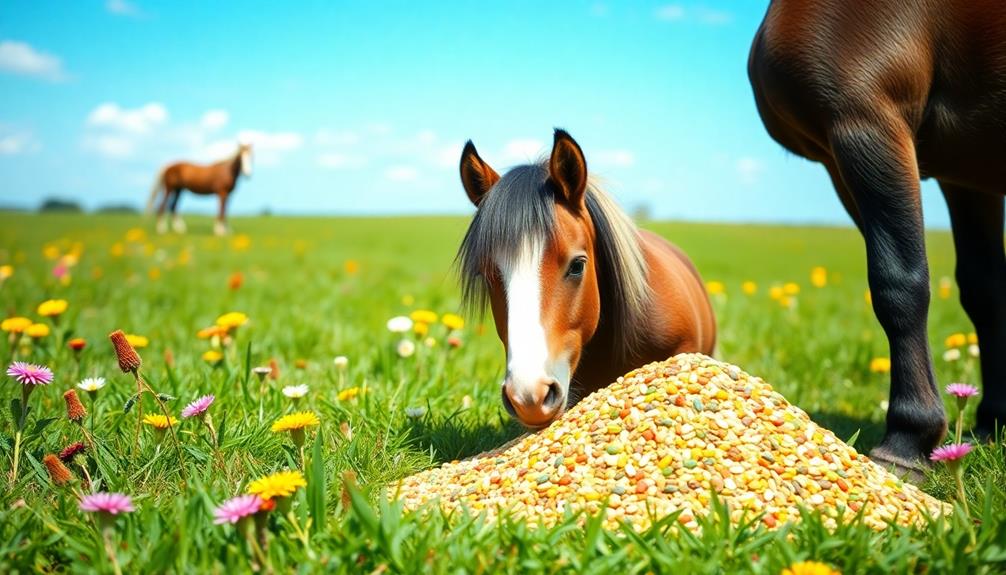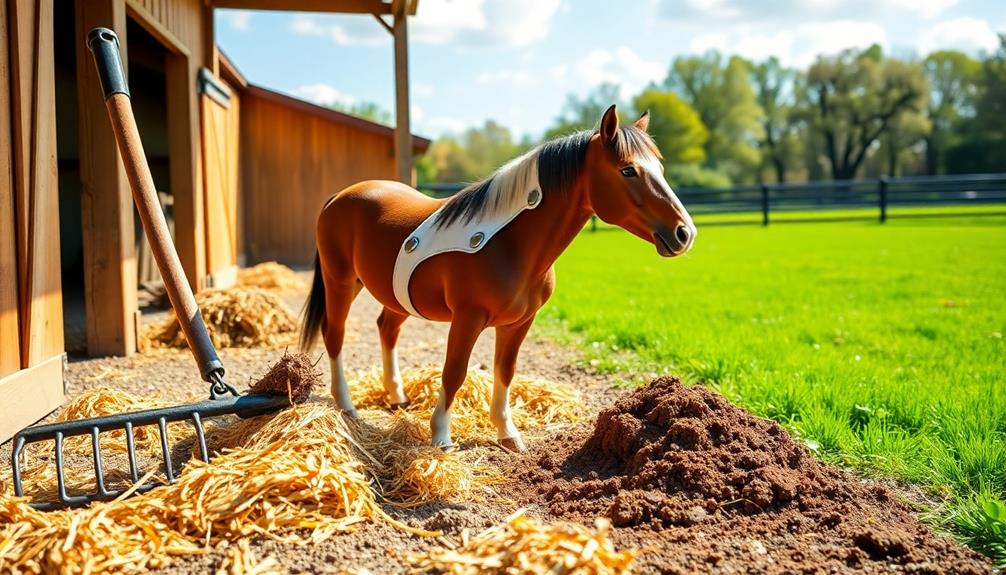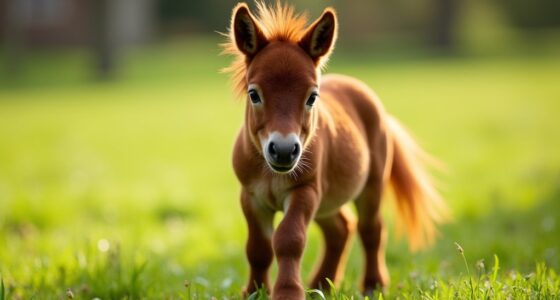Yes, mini horses can eat sweet feed, but you must be cautious. Their small size makes them more susceptible to obesity and health issues like insulin resistance if they consume too much sugar. It's better to prioritize high-quality hay and low-sugar alternatives to keep them healthy. Always monitor their weight and adjust their diet based on activity levels. Gradually introduce any new feed to avoid digestive problems. For a healthier approach, consider low-carb feeds or homemade mixes. There's much more to learn about maintaining your mini horse's health and nutrition.
Key Takeaways
- Mini horses can eat sweet feed, but it's crucial to monitor their sugar intake to prevent health issues like obesity and insulin resistance.
- Sweet feed should be introduced gradually to avoid digestive upset; sudden changes can lead to colic.
- Prioritize high-quality forage as the main diet component, limiting sweet feed to small amounts if necessary.
- Consider low-carb, low-sugar alternatives to sweet feed to promote better health and prevent metabolic disorders.
- Regular health checks and consultations with veterinarians are essential to adjust feeding based on individual needs and conditions.
Understanding Mini Horses
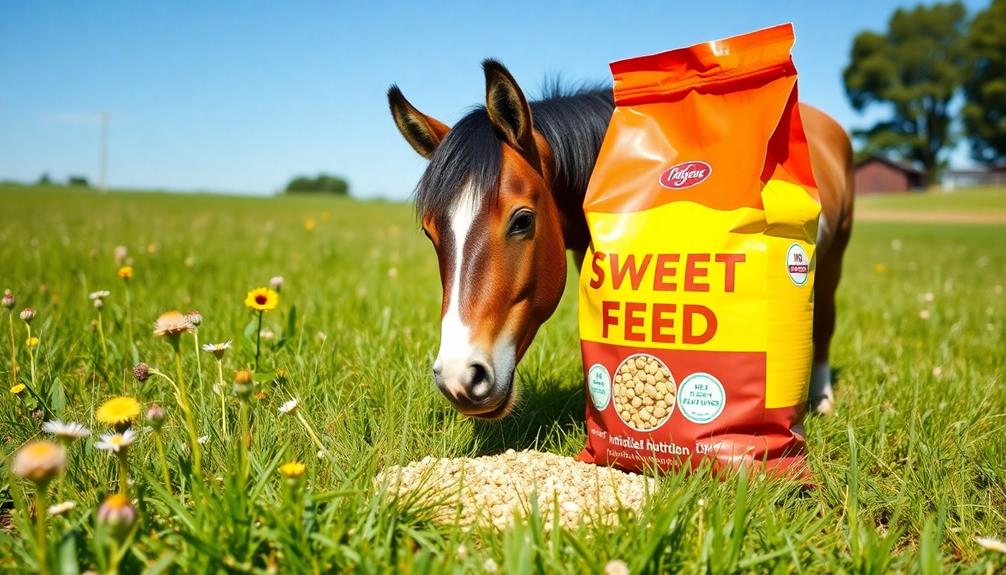
Miniature horses, often called mini horses, are charming companions that stand no taller than 38 inches at the withers and generally weigh between 150 to 300 pounds.
Unlike ponies, they share more physical traits with standard horses, including a similar dental structure. This makes them prone to dental issues and other health problems like colic, especially given their hearty appetites.
You need to manage their diet carefully to maintain a healthy body condition. Miniature horses are often classified as easy keepers, which means they can gain weight quickly if overfed.
To guarantee their well-being, focus on high-quality hay as their primary forage, and avoid excessive amounts of concentrated horse feeds.
You should provide a balanced diet that meets their nutritional needs, similar to full-size horses, but be mindful of their smaller size.
Regular monitoring of their weight and body condition is essential to prevent obesity.
Nutritional Requirements
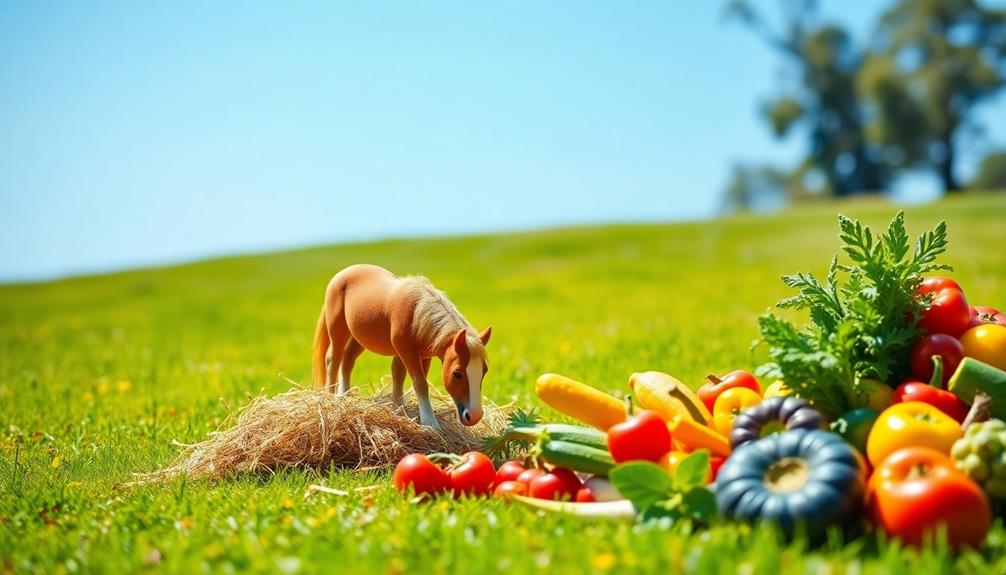
When it comes to the nutritional requirements of mini horses, you'll find they mirror those of standard horses but in smaller portions. Typically, a Miniature Horse consumes about 1.5% of its body weight in hay daily.
Forage should account for at least 1% to 2.5% of their body weight to guarantee they get enough fiber for peak digestive health.
It's vital to provide balanced feeds that include vitamins, minerals, and amino acids. Nutritional deficiencies can develop if the diet lacks quality feed.
Since miniature horses are prone to obesity, you'll need to carefully monitor their caloric intake, especially when introducing sweet feed, which often has high sugar content.
Regular health checks are important for adjusting feeding regimens based on activity levels and body condition scores. Ideally, you want to maintain a score between 4 to 6.
Risks of Sweet Feed
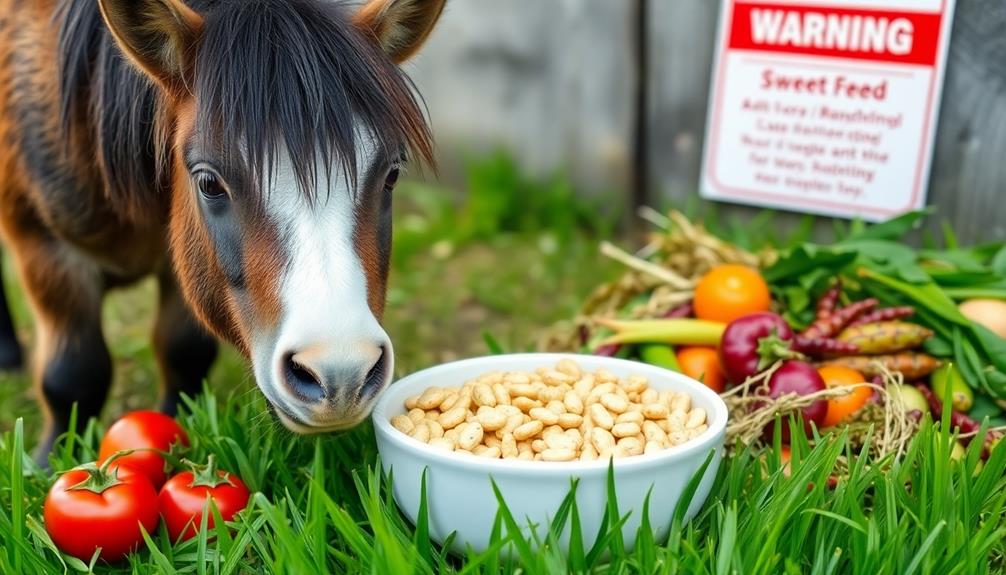
Sweet feed may seem appealing due to its palatability, but it poses significant risks to miniature horses. High in sugar and molasses, sweet feed can lead to serious health issues like insulin resistance and laminitis.
Because miniature horses are smaller, they're particularly vulnerable to obesity when consuming sugary diets. This extra weight can lead to a host of related health problems.
Moreover, overconsumption of sweet feed can trigger digestive issues, such as colic, caused by the fermentation of sugars in their stomachs. If you're considering adding sweet feed to your horse's diet, be cautious. It's essential to monitor their intake closely.
Excessive sugar can worsen symptoms of Cushing's disease and other metabolic disorders that are more common in miniature horses.
Always keep in mind that your horse's health is paramount. Instead of relying on sweet feed, consider healthier alternatives that meet their nutritional needs without the associated risks.
Health Implications
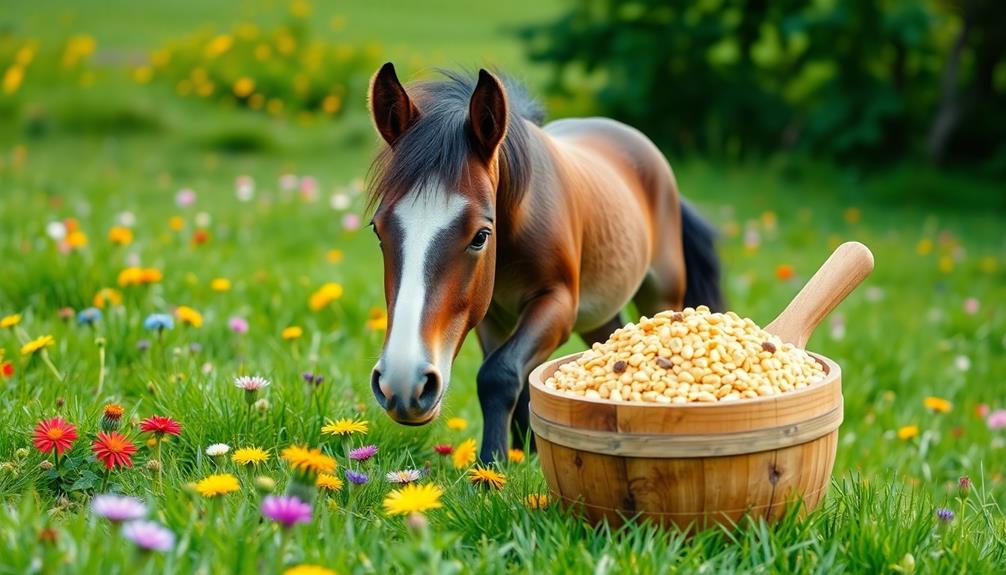
When it comes to your mini horse's diet, the sugar content in sweet feed can lead to serious health issues like insulin resistance and laminitis.
It's crucial to evaluate alternative feeding options that cater to their unique nutritional needs.
Sugar Content Risks
Steering through the dietary needs of miniature horses requires a keen awareness of sugar content risks, particularly because these animals are highly sensitive to high sugar levels. Consuming sweet feed can exacerbate insulin resistance and lead to serious metabolic disorders. The high sugar content in sweet feed is akin to candy bars, making it an inappropriate choice for your mini horse.
| Health Risk | Description | Prevention |
|---|---|---|
| Insulin Resistance | Increased sugar can worsen insulin sensitivity. | Limit sweet feed and monitor intake. |
| Laminitis | High sugar levels can trigger painful inflammation. | Provide low-sugar alternatives. |
| Digestive Issues | Excessive sugar may lead to colic or septicemia. | Regular vet check-ups and monitoring. |
Regular monitoring is essential for miniature horses on sweet feed, as the complications from high sugar intake can escalate quickly. Always prioritize a diet that supports their health, as neglecting sugar content risks could lead to severe health issues or even fatalities. Be proactive in understanding these risks to guarantee your miniature horse lives a healthy, happy life.
Alternative Feeding Options
Exploring alternative feeding options is imperative for the health of miniature horses, especially considering the risks associated with high-sugar diets.
Sweet feed, packed with sugar and molasses, can lead to severe health issues like insulin resistance, laminitis, and colic. Instead, you should consider low-carb, low-sugar feeds, pellets, and complete feeds that offer a more balanced nutrition profile. These alternatives not only reduce the risk of health complications but also support ideal weight management.
If your mini is prone to obesity or metabolic disorders, careful dietary management becomes essential. Many horse owners have reported improved health outcomes after switching from sweet feed to healthier options. This underscores the significance of tailoring feeding strategies to meet your mini's specific needs.
Regular consultation with veterinarians or equine nutritionists is critical to guarantee your miniature horse gets balanced nutrition without relying on sweet feed.
Recommended Feeding Practices
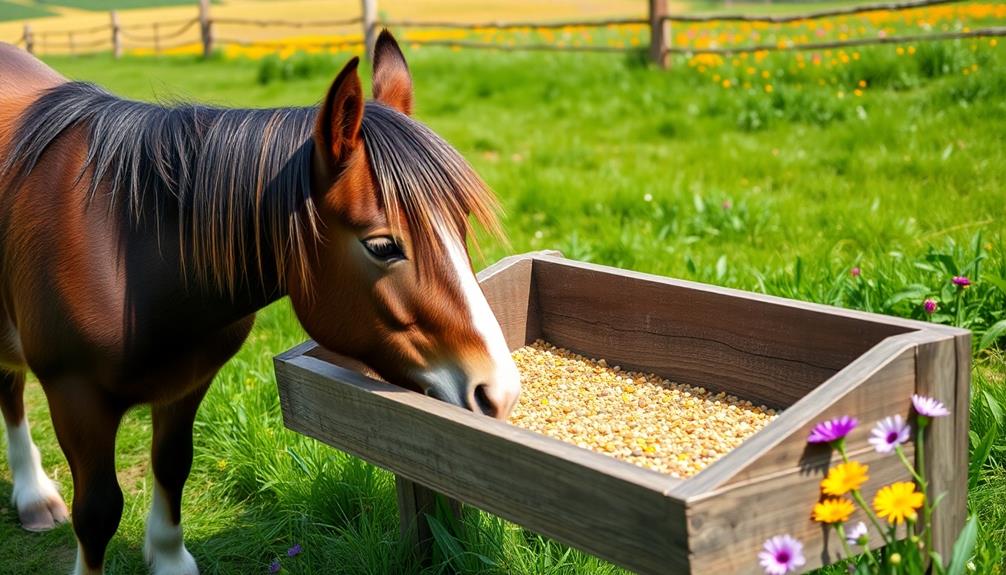
Mini horses thrive on a diet tailored to their specific needs, so it's vital to focus on their nutritional requirements. One of the key recommended feeding practices is to provide high-quality forage, such as hay. Aim for a daily intake of about 1.5% of their body weight to guarantee proper nutrition while avoiding sweet feeds, which can lead to health issues like laminitis and colic.
You should adjust their feeding regimen based on their activity level. Less active minis need fewer calories, so it's best to steer clear of high-sugar concentrates.
Regular monitoring of your mini's body condition is important; an ideal body condition score ranges from 4 to 6. This score helps you determine if dietary adjustments are necessary.
When introducing any new feed, make sure to shift gradually to prevent digestive upset. It's always a good idea to consult with a veterinarian or equine nutritionist for personalized feeding plans that suit your mini's unique needs.
Alternatives to Sweet Feed
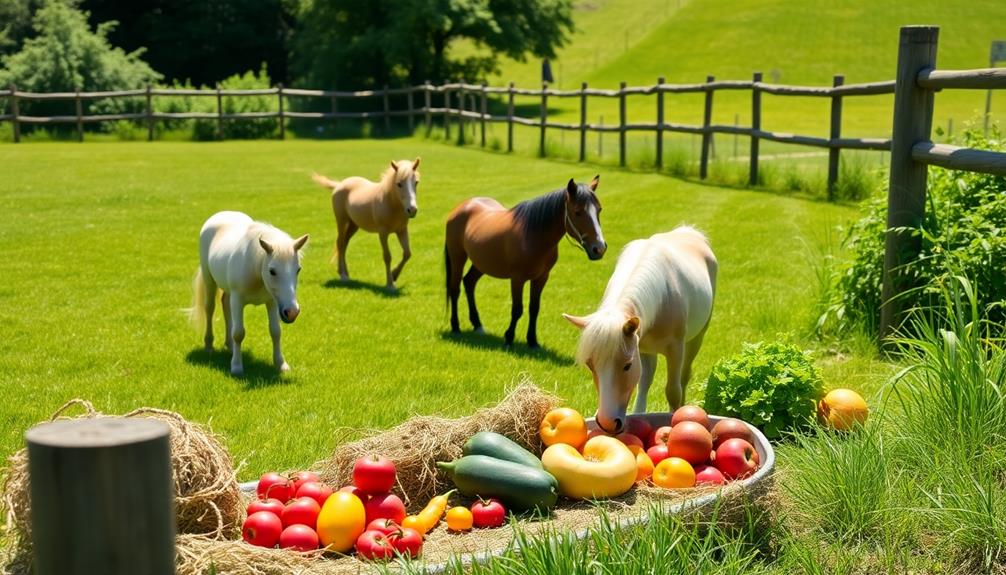
When it comes to feeding your miniature horse, alternatives to sweet feed can provide better nutrition without the risks associated with high sugar content.
Consider switching to low-carb, low-sugar feeds that are specifically formulated for sensitive horses. These options help prevent health issues like insulin resistance and laminitis.
Pelleted feeds are a great choice, as they offer balanced nutrition and digestibility. Extruded pellets, in particular, can provide a more complete nutrient profile compared to traditional sweet feeds.
You might also explore oats and beet pulp, which are beneficial supplements that can enhance your horse's diet.
Don't forget that quality hay and pasture should remain the foundation of your miniature horse's nutrition. The alternatives to sweet feed should complement this base rather than replace it.
You can even create homemade mixes, giving you control over the ingredients and sugar levels, ensuring your horse gets a balanced diet tailored to its specific needs.
Community Insights and Experiences
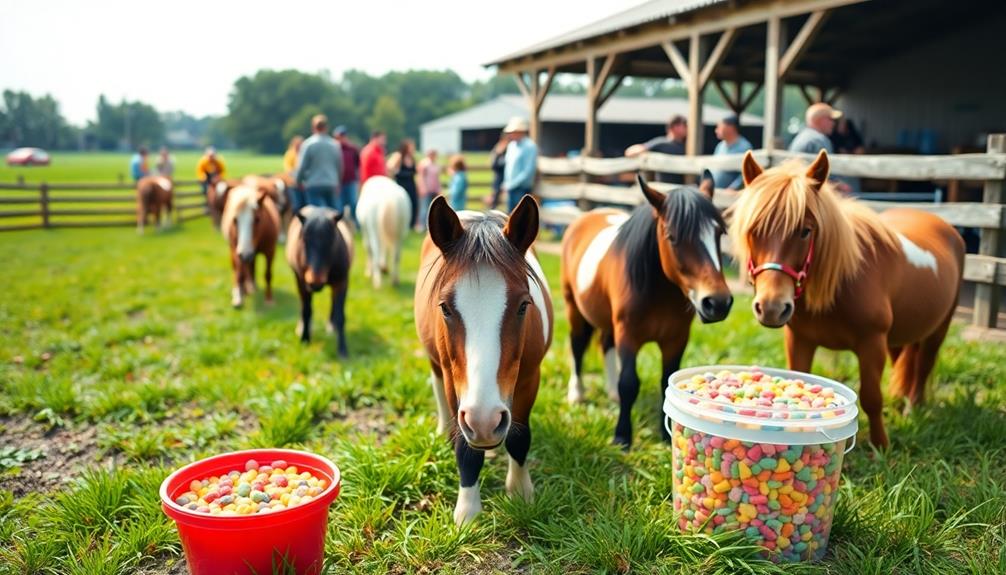
Horse owners often share valuable insights about their experiences with sweet feed and its alternatives. Many have found that while some mini horses can tolerate sweet feed, others face serious health issues like laminitis or colic due to its high sugar content.
It's vital to monitor how your mini responds to different feeds. You might discover that your horse thrives on sweet feed, or you may need to implement strict dietary restrictions for their health.
Community discussions frequently highlight the benefits of shifting mini horses off sweet feed. Owners report improved overall health and condition after switching to healthier alternatives.
However, be aware that if your mini is accustomed to sugary diets, they might refuse healthier options.
Many in the equine community emphasize the importance of consulting with veterinarians or equine nutritionists to create tailored feeding plans. Regular health assessments are essential to prevent complications linked to sweet feed.
Sharing your experiences with others can provide valuable insights, helping you make informed decisions about your mini horse's nutrition and well-being.
Frequently Asked Questions
What Is the Best Feed for a Mini Horse?
For your mini horse, focus on high-quality forage and a balanced feed with essential nutrients. Avoid sweet feeds; instead, opt for low-carb, low-sugar options. Always consult a vet to meet their specific needs.
Can I Feed My Horse Sweet Feed?
Is feeding your horse sweet feed really a good idea? You should avoid it due to high sugar content. Instead, opt for healthier alternatives that promote balanced nutrition and support your horse's overall health.
Can You Feed Horses All Stock Sweet Feed?
You shouldn't feed horses all stock sweet feed. It's typically high in sugar, which can lead to health issues. Choose low-carb, quality forage or specialized feeds to meet their nutritional needs safely and effectively.
Can a Horse Eat Too Much Sweet Feed?
Yes, a horse can definitely eat too much sweet feed. Overconsumption leads to serious health issues like obesity, insulin resistance, and colic. Always monitor their intake and consult a vet for guidance on proper nutrition.
Conclusion
In summary, while mini horses can technically eat sweet feed, it's not the best choice for their health. Think of their diet as a balanced palette—too much sugar can lead to serious health issues. Instead, focus on providing hay, fresh grass, and specialized mini horse pellets to guarantee they thrive. By prioritizing their nutritional needs and avoiding sweet feed, you'll paint a healthier picture for your mini horse's life and longevity.
